
BLOG
Storytelling Is About Relationships
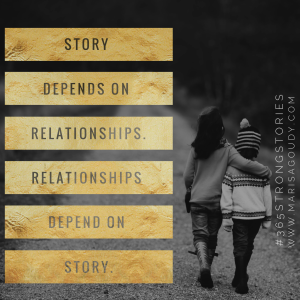 Is this your fantasy too?
You get to be the person with the space, the time, and the luxury to simply write. Uninterrupted days are lavished on your own ideas without a care for the reader or the marketplace.
Is this your fantasy too?
You get to be the person with the space, the time, and the luxury to simply write. Uninterrupted days are lavished on your own ideas without a care for the reader or the marketplace.
Well, that is certainly my fantasy, but we all know I have an incurable addiction to words and sentences. Maybe your fantasy is that you'd never have to write another word again! Maybe you pray that you'll be able to build a solo business or practice without creating online content and telling your brand's story.
Whether your a born writer or you're someone who needs to be tied to the keyboard to get the blogging done, we all need a reality check:
Stories depend on relationships and relationships depends on story.
Next week, in the Connect with Readers & Clients: Discover the Story Triangle we're going to explore how stories build relationships and how stories depend on relationships.
We go a little in today's Facebook live video (below). Be sure to sign up for the free webinar to learn how to make these relationships work in your own writing. Save my seat!
The People Need Stories, Not To Do Lists
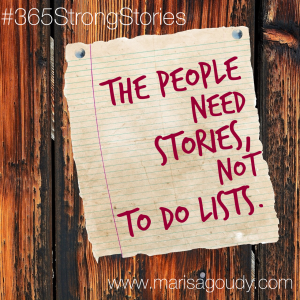 The difference between telling a strong story and writing “just another blog post”
The difference between telling a strong story and writing “just another blog post”
There are million different ways to approach a topic. Say you wanted to write about how to talk with your partner about a struggles a creative entrepreneur.
You could use the good old “people love list posts” approach:
Seven ways you “should” approach the situation including “make a spreadsheet that he can understand!” and “make sure everyone is well-rested and ready to fully engage in the conversation.”
If your readers are worrying about how to get their partner to be more supportive of a business venture, they just might come away with a tip that helps them along.
But then there’s the storytelling approach:
It’s one a.m. when she gets to bed. She’s chilled from sitting at the computer for so long and feels so grateful when he entangles his sleep warmed limbs with hers. Visions of Facebook ads and YouTube clips swim before her eyes as she tries desperately to sleep. The kids will be up soon and there’s so much more work to do to get this new course launched.
He knows the pattern of her breath. He knows it doesn’t mean anything good. “Did you get everything done?” he asks. When she snorts, he asks, “Did you get at least one thing done? Are you upset?
“Yes. And yes.” She starts to cry because finishing up a LeadPage doesn’t feel like much when the to do list stretches across so many notebook pages.
She is not ok. She is tired and she is scared and she is so desperate for all of her work to pay off.
It would have been easy to mumble “it’s all good” and roll over to feed her fears into the lonely darkness. Instead, she chose to be honest. She chose to speak her truth and ask her husband for the kind of help that only he can give - to listen to her in the darkness and make the world feel safe again.
Though they’ll both be exhausted in the morning, there’s one less brick in the wall between them. There’s space for sunshine and support and connection to flow in their marriage, in her business, and in their bank account.
This is why storytelling works
Because it’s a story, the reader connects with you in a real way that builds trust. They get drawn in by the emotion. Even if they’re not looking for “quick and easy tips for having tough conversations with your spouse about your business,” people who understand the challenges of entrepreneurship will be drawn in.
Stories are like giant magnets for the brain - people want to be invited into the room, into the conflict, and into the resolution. A story like this one shows them they’re not alone and exposes the other side of “grow your six figure online business” sales pitches.
How to make storytelling work for you, your audience, and your business
Is that my story above? Well, I can tell you that I am launching a new course and I’m pretty sleepy today…
That’s not the point of all this, though. My goal is to help you understand that stories are what connect you with your readers and with your potential clients.
We dive deep into why we need stories and list posts in the Connect With Your Readers & Clients: Discover the Story Triangle webinar. The recording will be available through Monday, April 11.
What to do when content you loved writing doesn't get read
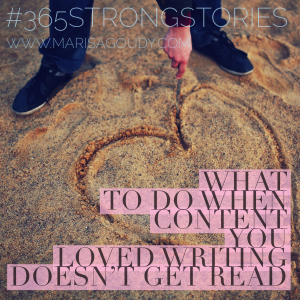 Even though every creative entrepreneur and every thought leader looking to make a difference has been there, it still hurts. It's hard when content that you poured your heart into does not connect.
This morning after St. Patrick's Day, I woke up with a different kind of hangover than might be considered the traditional type you often experience "the morning after the night before." I had something of a "creativity hangover" because I was disappointed the content I had loving crafted in honor of one of my favorite days of the year didn't get read.
Even though every creative entrepreneur and every thought leader looking to make a difference has been there, it still hurts. It's hard when content that you poured your heart into does not connect.
This morning after St. Patrick's Day, I woke up with a different kind of hangover than might be considered the traditional type you often experience "the morning after the night before." I had something of a "creativity hangover" because I was disappointed the content I had loving crafted in honor of one of my favorite days of the year didn't get read.
Today's #365StrongStories post is a video that explores that tension between the need to create from your core and the need to connect with an audience.
When you take the risk of exploring your passion and focus on telling the story that is important to you, you are almost guaranteed to take your eye off the marketing ball (at least for a little while). You have to do that from time to time if you want to grow new, provocative ideas that will make into someone worth listening to.
Here's to understanding that not everything you write or produce is going to have the luck o' the Irish - even when you post it on March 17! Here's to valuing the comments more than the numbers of retweets. Here's to recognizing that this happens to all of us from time to time.
Created something that you loved that just didn't get seen? Post the link in the comments and I promise to visit and respond!
Is That a Rant or a Story?
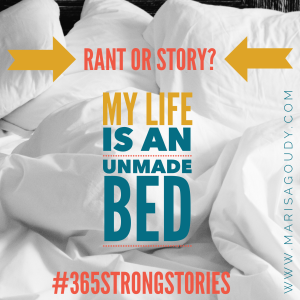 This morning as I rushed from room to room gathering necessary clothes and snacks and computer accessories and toys, it occurred to me:
My house is like an unmade bed.
This morning as I rushed from room to room gathering necessary clothes and snacks and computer accessories and toys, it occurred to me:
My house is like an unmade bed.
I was tangled in the twisted bed clothes of an entire household of stuff. Everything I needed was lost in this riot of a rumpled nest and it felt nearly impossible to meet the day.
This blistering tirade fueled my mad dash (because, of course, one girl had to make the bus and another had to be dropped at playgroup exactly on time so that mama could make her daylong VIP session with a client).
Once I was safely belted into a quiet car with my coffee, I began composing the day’s story in my head, so pleased that I had such a powerful image and title. But then I paused.
Was I a storyteller or a cranky woman who just wanted to score some sympathy points for performing the impossible? (At this point, I realized that I wasn’t a righteous super hero. I would probably just sound like a disorganized creature who, though hilariously human, was also a trifle whiny.)
Do you want to entrance them with story or blind them with shared rage?
A strong story is compelling. It moves the reader to say “me too!” and click share. Of course, the same can be true in the case of a red hot rant that pushes your audience’s buttons.
But one of these is likely to be full of gory details that you don’t want to revisit or defend in conversation. It’s about a topic that’s too intimate, too raw, too prone to morning after regret.
When you think about it that way, if you’re writing to build your business and establish your professional reputation, you want to avoid that kind of TMI like the plague.
An authentic blog post is intended to give people a window into your world, but the goal is to hold onto a few shreds of dignity and authority so that readers will say “I want to work with that human.”
A story is a well processed piece of prose that features a beginning, a middle, and an end. It has a conflict and a resolution and a protagonist you can root for.
When you write a story, you want to be vulnerable, but you’re not yowling about an open wound like you might in a full blooded rant. Instead, you’re showing off your healed scars with a smile.
How do you know when your post is more diatribe than engaging story?
A rant doesn’t have a strong ending. It may not even have a clear beginning. It’s all messy middle as far as your harangue colored glasses can see.
There’s plenty of conflict, but resolution hides below the horizon of a limitless sea of indignation.
Now, your rant may have characters - generally the wounded party (who may or may not be you, the writer) and the evil perpetrator (an actual villain or just the beasts of excess and chaos). In your unfiltered narrative, you might not be able to make your hero likeable enough to root for. An angry victim will boil alone in her vitriol if she doesn’t have a plot to hold her and prove her case.
Ask yourself: how do I want to connect?
We live in the age of storytelling, not in the age of tirades.
Ok, so that is a total lie seeing as we are living through an American presidential campaign, but we really are in a golden age of storytelling when we get to market our businesses not through newspaper ads but through content that connects.
An emotional explosion might bring the right people through your door. But, most often, those rants will fall flat and keep keep your ideal clients at arm’s length. How can they see the solutions you offer through the drama you describe?
Write stories, not rants. Your readers and your business will thank you for it.
Need some help telling a story that connects? Download your free strong storytelling guide now.
5 Reasons to Keep Writing & Creating Content You Care About, #365StrongStories 55
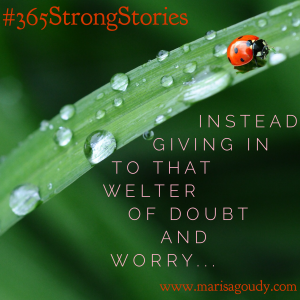 Anyone could blame the weather.
Here in New York, we have been been slipping from spring sunshine to a few inches of February fluff to slush and misty gloom. All of it is born away on a tide of mud that just never washes out.
Anyone could blame the weather.
Here in New York, we have been been slipping from spring sunshine to a few inches of February fluff to slush and misty gloom. All of it is born away on a tide of mud that just never washes out.
Or, I could blame motherhood and all the ways it shatters my focus and steals my sleep.
And, if I chose, I could blame the creative impulse itself. This need to write and share and connect with readers is a mad, beautiful journey.
No matter the reason, it’s easy to lose track of the “why” during long, dreary days at home in front of the laptop. It's easy to forget about the great goals when the to do list never ends.
Why add more words and pages to this noisy digital world? Why steal time from my family just to try to be seen and read by strangers? Why not just get a job instead of making it all up as I go along?
The welter of worries that threatens to swallow all the creative and professional dreams. You know them too, I am guessing?
And so, the aimless Facebook scrolling begins. Fortunately, I’ve been at this game of questions long enough to stop myself before I start reading my spam messages or looking up high school boyfriends’ little sisters.
Instead, I seek out the resources I know will replenish me and get me back on course: the insights from clients and colleagues I know and love.
We're much the same as we try to carve out enough space for family and relationships and for entrepreneurship and creative passions too. We have unique goals and needs and sources of inspiration to make the balancing act work, but when we can rally together to share the “why” of it all, all of us can get back on track.
This isn't the first time I've worried that there are too many stories out there already, of course.
Luckily, last time I began to believe that the emerging thought leaders I long to help were just too busy being awesome at life and work to sit down and create content they really care about, a wise friend and colleague got me back on track. She reminded that she knows writing and diving deep into her ideas is vital to her practice and her big dreams.
As she described it, you need to write blog posts and HuffPo articles and all the rest because:
- Content builds trust
- It’s how clients get to know you
- It’s how you weed out the wrong people before they even call
- It’s how you first inspire people to know you’re worth your full fee
- Content makes people want more of you in programs and classes and all the good stuff you want to sell
I couldn't have said it better myself!
Your turn: Are you convince you need to create content? What's your "why"? (And I would love your answers even if you're thinking "I know I should start writing but I just can't make it a priority")
